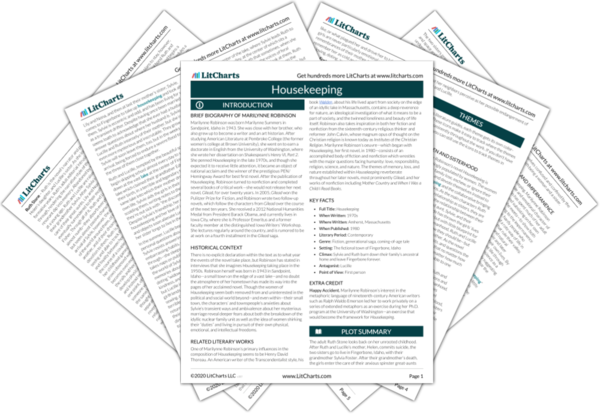Housekeeping is, throughout the novel, more than just cleaning house and keeping things in order. It is a sacred act of guardianship and preservation—to “take up housekeeping” within the novel, a duty circumscribed to its female characters, is to accept stewardship of a home and all the lives, memories, and precious inanimate objects contained within it. Housekeeping is a subjective process, interpreted and carried out differently by all the novel’s major characters. To Sylvia Foster, the Foster family matriarch and Ruth and Lucille’s grandmother, housekeeping means cookies and applesauce on rainy days, locks of hair from her children’s first haircuts saved in drawers, “whit[ing] shoes and braid[ing] hair and fr[ying] chicken.” To her daughter Sylvie, however, housekeeping is less about the act of keeping house than it is about maintaining the soul of the home. Sylvie regularly sets curtains aflame when cooking, and becomes a hoarder of old magazines and newspapers—but she attempts to fill the house with dusky evening light, fresh air from the back door to the apple orchard, and old cans and jam jars for which she knows she’ll someday find a use. Throughout the novel, the act of housekeeping becomes a potent symbol for the various ways in which women assume—or shirk—responsibility for their families and family legacies. In the end, Ruth and Sylvie burn down their family’s ancestral home, and “there [is] an end to housekeeping.” They reject traditional notions of femininity and opt for a life riding the rails, a life lived freely and untethered—but they always wonder whether the house survived, and whether Lucille has taken up housekeeping in their place. The burdens and pleasures of housekeeping are different to every woman within the text, as they are, in life, to every person in the real world who has ever faced the decision of whether to save or discard, to tidy or ignore, to stay or to leave.
Housekeeping Quotes in Housekeeping
Lucille and me she tended with scrupulous care and little confidence, as if her offerings of dimes and chocolate-chip cookies might keep us, our spirits, here in her kitchen, though she knew they might not.
Thus finely did our house become attuned to the orchard and to the particularities of weather, even in the first days of Sylvie’s housekeeping. Thus did she begin by littles and perhaps unawares to ready it for wasps and bats and barn swallows. Sylvie talked a great deal about housekeeping. She soaked all the tea towels for a number of weeks in a tub of water and bleach. She emptied several cupboards and left them open to air, and once she washed half the kitchen ceiling and a door. Sylvie believed in stern solvents, and most of all in air. It was for the sake of air that she opened doors and windows, though it was probably through forgetfulness that she left them open.
Lucille had startled us all, flooding the room so suddenly with light, exposing heaps of pots and dishes, the two cupboard doors which had come unhinged and were propped against the boxes of china. […] Everywhere the paint was chipped and marred. A great shadow of soot loomed up the wall and across the ceiling above the stove, and the stove pipe and the cupboard tops were thickly felted with dust. Most dispiriting, perhaps, was the curtain on Lucille’s side of the table, which had been half consumed by fire once when a birthday cake had been set too close to it. Sylvie had beaten out the flames with a back issue of Good Housekeeping, but she had never replaced the curtain.
Who would think of dusting or sweeping the cobwebs down in a room used for the storage of cans and newspapers—things utterly without value? Sylvie only kept them, I think, because she considered accumulation to be the essence of housekeeping, and because she considered the hoarding of worthless things to be proof of a particularly scrupulous thrift.
Sylvie and I (I think that night we were almost a single person) could not leave that house, which was stashed like a brain, a reliquary, like a brain, its relics to be pawed and sorted and parceled out among the needy and the parsimonious of Fingerbone. […] We had to leave. I could not stay, and Sylvie would not stay without me. Now truly we were cast out to wander, and there was an end to housekeeping.

















